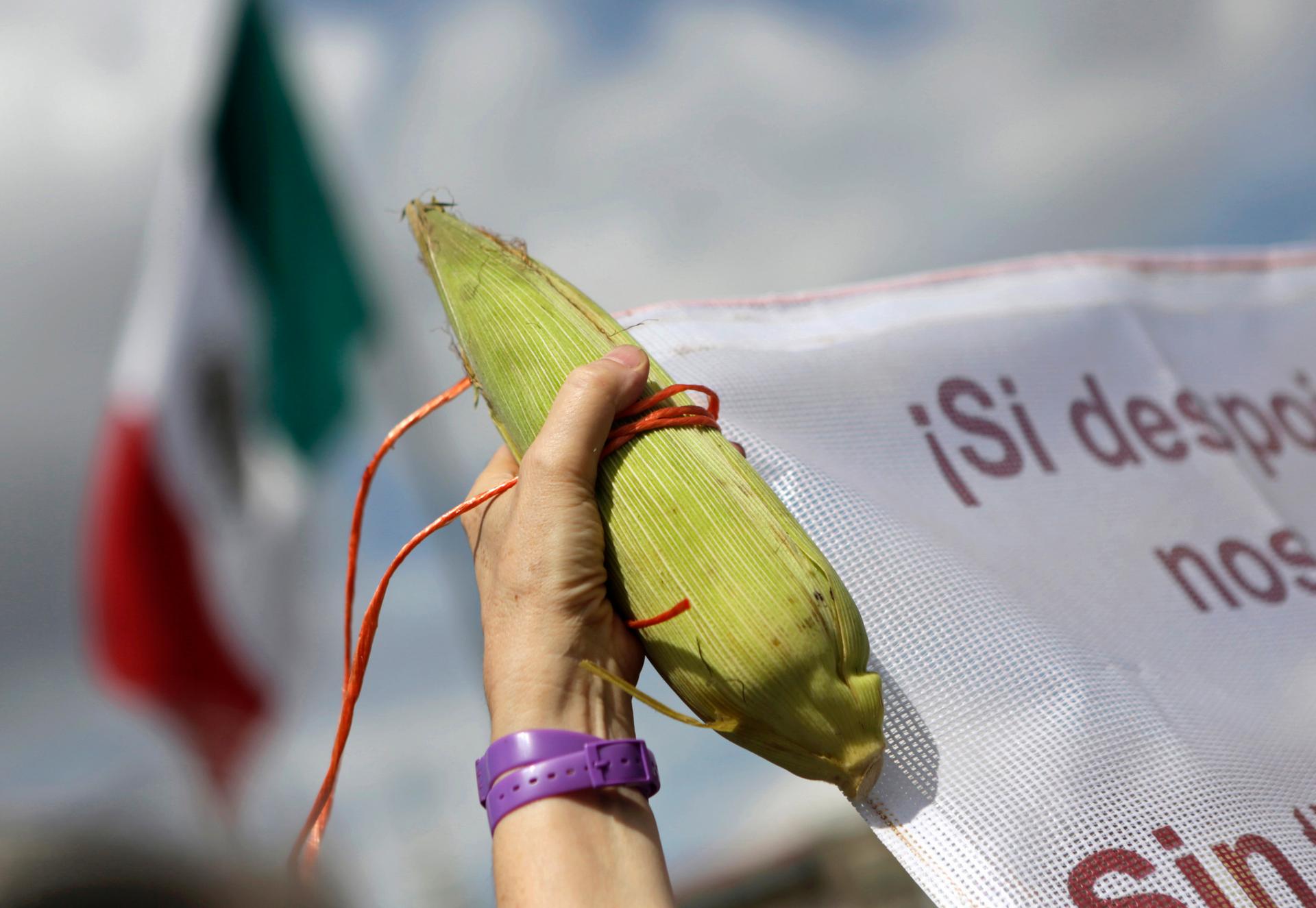A Mexican demonstrator holds a corn cob on "Día Nacional del Maíz" (National Corn Day). Mexicans have an expression: "sin maíz, no hay país” (without corn, there is no country). Mexico has been increasingly reliant on US imports since NAFTA took effect.
When President Donald Trump talks about Mexico taking advantage of NAFTA to rip off the US — and he brings this up a lot — people like Fernando Turner can’t believe what they’re hearing.
“We appreciate his tremendous confidence in Mexicans’ ability to cheat US people, no? But that’s totally the contrary. History tells you that it has been the other way,” says Turner, the secretary of economic development and labor for the northern Mexican state of Nuevo León.
Nuevo León is teeming with US-based multinationals, and its capital, Monterrey, has become one of Latin America’s wealthiest cities. The city was built on manufacturing, primarily Mexican steel, but has also been helped by American companies moving operations there after NAFTA, the North American Free Trade Agreement, took effect in 1994. The trade agreement allowed for a much freer flow of trade between the US, Mexico and Canada, and 22 years in, the US had a $63 billion trade deficit last year.
But just because American companies like General Electric and Ford have factories in Nuevo León, and the trade surplus tilts heavily toward Mexico, doesn’t mean the average Mexican is getting rich.
“When you look at the types of jobs that are created because of the maquila industry, meaning the manufacturing industry in Mexico, those are very poor jobs,” says Viridiana Rios, a political scientist based in Mexico City who teaches courses remotely for Purdue University in Indiana.
Many Mexican factory workers earn just $2-$3 an hour, or less. That, says Rios, is locking Mexicans into a cycle of poverty.
“Many of the daughters and the sons of the maquiladora workers end up in crime, end up doing drugs, end up being part of the cartels because the jobs that their father has and their mother has gives them no time to provide vigilance, education, gives them no money to put their kids in good schools.”
That’s one perspective. However, investment coming from US corporations has hugely benefited Mexico, on the whole. And NAFTA created many manufacturing jobs in Mexico that do pay better than most agricultural work. Rios concedes these points, but says they aren’t enough.
“The only reason why Mexico and Mexicans are in favor of NAFTA is because they are not ambitious enough. It’s because they believe that the trade-off is: between being unemployed or being employed in these very poor industries.”
oembed://https%3A//www.youtube.com/watch%3Fv%3DMAhCC6mE0zI
This idea — acting more ambitiously — is catching on. More and more Mexican politicians are saying if President Trump wants to hash out a new trade deal, fine, let’s do it. There are lots of ways for an updated NAFTA to help Mexico. Consider agriculture.
“The United States government subsidizes, substantially, the agriculture,” says Turner. “So in a way, the Mexican growers are not competing in equal circumstances with the US growers because they don’t have subsidies that the United States has. That’s why we import 75 percent of the grains.”
Because US farmers get more help from the US government, US corn is cheap. As a result, Mexicans buy about $2.5 billion worth of it from the US each year. And Mexico is a country where children learn the expression: “Sin maíz, no hay país.” Translation: “Without corn, there is no country.”
Mexican farms need to regain their self-sufficiency and become exporters, says Timothy A. Wise, a researcher with the Small Planet Institute in Cambridge, Massachusetts.
Wise, who has studied Mexican corn, says a comeback for Mexican farmers can begin by renegotiating NAFTA, “to go to the table with something to demand, more protection for its corn farmers, we don’t want all your corn just flooding in. And we want to stimulate rural development from the bottom up by investing in small-scale corn farmers.”
Then there’s transportation. Mexican truckers want greater access to American highways. Right now, most cargo coming from Mexico is unloaded then reloaded onto American trucks at the border. The US trucking industry has long argued that Mexican trucks and drivers aren’t safe enough for American roads. Mexicans, naturally, see things differently. Business leaders — from both countries — argue that opening highways to Mexican trucks could lower transportation costs.
Then there are labor and environmental protections in Mexico that many on the left-side of the political spectrum would like strengthened if NAFTA is renegotiated.
“Mexico, it needs to put Mexico first in exactly the ways Trump wants to put America first,” says Wise.
But he isn’t optimistic. Wise says Trump’s priorities in renegotiating NAFTA are “prying more markets for US exports, and his [Trump’s] priorities are bullying Mexico into making more concessions.”
The politicial scientist Rios, meanwhile, would like Trump to stop saying Mexico stole American jobs and to come to Mexico and see the reality.
“Because you would see that the conditions of these people are nothing close to ‘The American Dream.’ The American Dream just disappeared for everybody, it didn’t come to Mexico.”
We want to hear your feedback so we can keep improving our website, theworld.org. Please fill out this quick survey and let us know your thoughts (your answers will be anonymous). Thanks for your time!
